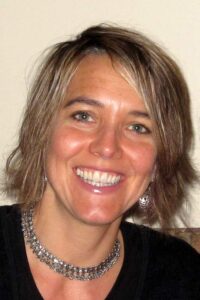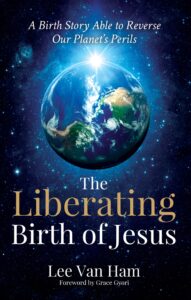Tree Planting Event Brings Sustainability to People’s Backyards
by John Michno
This month, at the global climate change talks, COP26 United Nations leaders set targets to plant trees. The San Diego Jubilee Circle is doing just that — planting trees in backyards around the county.
San Diego Jubilee Circle members gave impetus to a community tree give-away event where people learned about how to plant and care for trees. Thirty people went home with several dozen trees; 30% are already planted.
Through conversations in backyard gardens and at practice tree plantings, Jubilee Circle members Chris J., Lee, and I supported one another to gradually envision this tree planting program that we can repeat each year. We were able to do this on a low budget through volunteers.
Cities sometimes spend as much as $1000 to plant a tree. We wondered: how can we grow trees at a much more affordable $10?! Master Gardener and Arborist Robin Rivet coached me to grow saplings by gathering cuttings from our backyard pomegranate. She showed me how to apply rooting hormone to the cuttings. Robin, Steve, Jeanne, and I planted the cuttings in one-gallon pots in the spring. Lee and Norm joined us to care for the saplings for 6 months until now, the start of the rainy planting season. I discovered that the trees “talked” to me and told me what they needed. I gradually learned by watching the color and shape of the leaves that I could sense when they needed water and shade and when they had too much. I discovered the pleasure of slowing down and observing nature. The trees became teachers to me, teaching me to listen and be in the moment—like contemplative practices in religions.
Our diligence got trees in the ground. We’ll do it again next year.
Radical Inter-religious Cooperation Is at Work to Save Life on Our Planet
 Despite the religious right’s prominence in news stories, there is a radical cooperation going on among religions to address current crises and breakdown. Listen to the latest episode of the Simpler OneEarth Living Podcast tells how religions, with diverse spiritual paths, are working together to forge new possibilities in ecology, economics, and women’s empowerment—all are making real difference in their communities. One way this cooperation is happening is through inter-religious circles formed through United Religions Initiatives (URI). Our guest, Lauren Van Ham, is URI’s Climate Action Coordinator and gives us examples from URI’s Cooperation Circles.
Despite the religious right’s prominence in news stories, there is a radical cooperation going on among religions to address current crises and breakdown. Listen to the latest episode of the Simpler OneEarth Living Podcast tells how religions, with diverse spiritual paths, are working together to forge new possibilities in ecology, economics, and women’s empowerment—all are making real difference in their communities. One way this cooperation is happening is through inter-religious circles formed through United Religions Initiatives (URI). Our guest, Lauren Van Ham, is URI’s Climate Action Coordinator and gives us examples from URI’s Cooperation Circles.
Lauren was born and raised beneath the big sky of the Midwest, and holds degrees from Carnegie Mellon University, Naropa University, and The Chaplaincy Institute. After completing a B.F.A. in music theatre, Lauren pursued her childhood dream of living in New York City and worked off-Broadway. In 1998 she began graduate studies in the Bay Area in psychology, creation spirituality, and interfaith worldviews. Following her ordination in 1999, and until 2007, Lauren worked as an interfaith hospital chaplain, serving St. Mary’s Medical Center in San Francisco, where she specialized in adolescent psychiatry, palliative care and bereavement support.
After her ordination to interfaith ministry in 1999, and working in healthcare for nine years, she recognized that caring for the Earth had become her deep love and declared herself an eco-chaplain. She worked for a few years as a sustainability consultant with large corporations through Saatchi and Saatchi S before becoming Dean at The Chaplaincy Institute for interfaith ministries in Berkeley, California, for nine years. Now, in addition to her work with URI, she is a guest writer for “Progressing Spirit,” an interfaith spiritual director, and serves as guest faculty for several schools in the Bay Area. Her passion for spirituality, art and Earth’s teachings construct her focus in eco-ministry, grief & loss, and sacred activism.
Release Christmas so It Can Transform
 Dr. Rick Herrick (Ph.D., Tulane University), a former tenured university professor and magazine editor, is the author of four published novels and two works of nonfiction. His most recent book, A Christian Foreign Policy, presents a new way of looking at the relationship between religion and politics. The following book review by Rick Herrick was first posted on the “Progressive Christianity” website, September 30, 2020.
Dr. Rick Herrick (Ph.D., Tulane University), a former tenured university professor and magazine editor, is the author of four published novels and two works of nonfiction. His most recent book, A Christian Foreign Policy, presents a new way of looking at the relationship between religion and politics. The following book review by Rick Herrick was first posted on the “Progressive Christianity” website, September 30, 2020.
The Liberating Birth of Jesus by Lee Van Ham is a groundbreaking book for me. My passion for the last fifty years has been the study of the New Testament. According to Van Ham, I have gone about this study in the wrong way. This revelation both hurts; and yet, in a more important sense, is immensely helpful.
(Starting here, several paragraphs are omitted from the review by Herrick. Please click on this link and read his entire, thoughtful review.)
…Van Ham does an impressive job laying out data for both birth stories that indicate the stories are about Jesus’s identity as a new creation, a human being who has been taken over by God’s presence which is embedded in all living things. When you focus on understanding this data and internalize the story in a meaningful way, the story is transforming. It takes you to a different place. You, too, become infused with this divine presence.
 This encounter with the divine presence is critically important for Van Ham because he has an agenda with this book. He has a passionate concern for the threat of climate change and the damage to the world that results from an egocentric perspective focused on greed, power, economic gain, and consumption. He believes the only hope for mankind to survive the global crisis posed by climate change is to acquire a new way of thinking, a way of thinking defined by the presence of God living within us, a way of thinking made possible by the incarnation of Christ in all humans. One way to acquire this higher level of consciousness is to learn to read the New Testament with new eyes. This book shows you how to do that. It is an important book.
This encounter with the divine presence is critically important for Van Ham because he has an agenda with this book. He has a passionate concern for the threat of climate change and the damage to the world that results from an egocentric perspective focused on greed, power, economic gain, and consumption. He believes the only hope for mankind to survive the global crisis posed by climate change is to acquire a new way of thinking, a way of thinking defined by the presence of God living within us, a way of thinking made possible by the incarnation of Christ in all humans. One way to acquire this higher level of consciousness is to learn to read the New Testament with new eyes. This book shows you how to do that. It is an important book.
The book is available through Barnes and Noble, Powell’s and a few others, if you’d like to avoid buying it on Amazon (as I do), but it’s available there too as a print copy or ebook. Also, to the first five people who ask, the author will happily send you a free copy. Make it a part of your reading leading up to December 25. Make your request to lee@jubilee-economics.org.
Also, for more reviews of the book, click here then scroll down.
Yobel School in Chiapas Continues Training of Leadership
by Pedro Robledo Ramirez
Our continuing education program continues to meet the demands of leadership ecclesial and seminary teaching staff. Faced with the pandemic situation that is being experienced due to COVID-19, the courses are facilitated through the virtual platform of Zoom. According to the availability of the teaching team and the health conditions, some courses are intensively facilitated over four sessions in a week or one month. In the case of the second option, two-hour sessions are held on the weekends throughout the month. The courses offered include Bible, Theology and Missiology. Because of great solidarity among teachers, so far some courses have had no cost.
During this year, these courses have been offered in alliances that have been established with the Presbyterian Theological Seminary “Nicanor F. Gómez” in Toluca, MX, the Evangelical University of Nicaragua, and with the Mexican Nazarene Seminary. In addition to students from Institutions mentioned above, we also have students from Yobel and the Faculty of Higher Studies in Humanities and Theology (FESHT).
Brothers and sisters who are professionals participate in class sessions. They are leaders who work in church ministry and pastoral teams or who are teachers in seminars and seminaries of various evangelical denominations. In our archive we have the names of the student population that have benefited from our programs training.
During the month of June, colleague Reynaú Omán Santiago Marroquín began planning two educational projects. (1) The first consists of the establishment of a headquarters for the Evangelical University of Nicaragua “Martin Luther King Jr.” (UENIC), which will offer the degree of the Bachelor of Theology. With this we will continue our plan for certification and professionalization of theological studies with the UENIC. (2) The other project is a socio-theological, intercultural, contextual and ecumenical training program that will be offered by the Institute for Intercultural Studies and Research (IESII). The courses are: Religious Sciences, Sacred Scripture, Philosophy and Modern Languages of the Indigenous peoples. In addition, Diplomas in Biblical Languages are also being considered: Hebrew, Aramaic, Greek, and maybe Latin.
We thank our God for his faithfulness in providing sources to bless our educational ministry. Trusting in the grace of our God that strengthens and helps us, we will continue to fulfill the plans and goals of our educational ministry here in Chiapas.
We are happy to have received the financial support of JEM in the realization of our educational ministry. So on behalf of our board, I express our great appreciation. It is our wish and prayer for our God to unite us to continue accompanying formation processes biblical and theological, which intend to promote life in our peoples and in all of creation.
Sincerely:
“Contextual formation for the people of God”
Pedro Robledo Ramirez
Academic coordinator
San Cristobal de las Las Casas, Chiapas; as of September 16, 2021.






